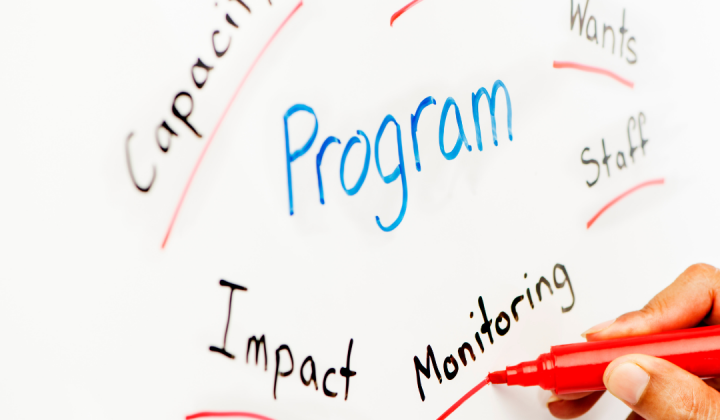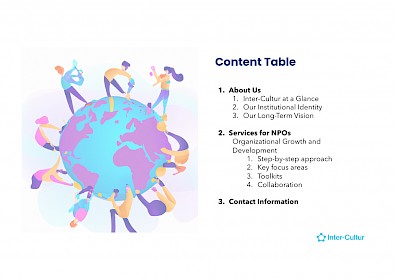Strategic Alliances and Professional Services for NGOs
Capacity building
We offer comprehensive services to enhance NGO's capacity in strategy, knowledge management, operations management, and change management. Our approach is collaborative, working closely with clients to integrate these improvements seamlessly into their processes.
Institutional training
Our institutional training programs cover project management, communications, impact measurement, leadership, risk management, and sustainability. This structured method provides essential skills and knowledge from our experts to NGO staff, enhancing their capabilities and overall impact.
Integrated framework for social development initiatives

Strategic design of social programs
Collaborating with development partners, we co-create impactful social programs using the Logical Framework Approach (LFA). This systematic methodology ensures clear objectives, risk identification, and measurable outcomes, enhancing program effectiveness and stakeholder alignment.

Sustainable financing for social initiatives
Securing funding from public and private sources, including key partners like the Ministry for Foreign Affairs of Finland, is crucial for our projects. Reliable financing ensures the longevity and success of our programs, allowing for sustainable and lasting impact.

Performance evaluation and enhancement
Through comprehensive Monitoring and Evaluation (M&E), we maintain accountability to stakeholders, learn from our experiences, and make informed decisions. This continuous feedback loop improves current programs and enhances future initiatives.
FAQ
What phases are involved in the consultancy process?
The consultancy process consists of several phases:
- Definition of Scope: Identifying and agreeing on specific needs, objectives, and expectations based on the initial diagnosis.
- Planning: Establishing objectives, strategies, and necessary resources and timelines.
- Design and Development: Creating tools, strategies, protocols, or systems to address the identified needs.
- Implementation: Executing the designed solutions, including process optimization and staff training.
- Evaluation and Feedback: Analyzing the effectiveness of the implemented solutions and verifying if the objectives have been achieved.
- Closure and Transition: Concluding the project and handing over all deliverables, ensuring knowledge transfer for ongoing management.
How are consultancy services defined and developed?
The consultancy services are defined through an initial diagnosis to identify the specific needs and objectives. The scope of the services is then selected in agreement with the Beneficiary Partner, followed by a planning phase to establish objectives, strategies, and necessary resources. The project progresses through design and development, implementation, evaluation, and feedback, and finally, closure and transition, ensuring all agreed objectives are met within a three-month period unless extended by mutual agreement.
What are the responsibilities of the Service Partner?
The Service Partner is responsible for providing diligent and professional consultancy services, adapting to changing circumstances, maintaining objectivity, and respecting the ethos of the Beneficiary Partner. This includes continuous collaboration, access to essential information, participation in workshops, and communication of any changes that might affect the consultancy services.
How do you ensure the consultancy services are affordable and accessible?
We ensure that consultancy services are affordable by requiring the Beneficiary Partner to contribute a minimum amount towards the cost. If the total cost exceeds this contribution, the Service Partner will seek additional funding from third parties or consider subsidizing part of the services. This approach helps make our consultancy services accessible without financial barriers being a significant obstacle.
The agreement ensures that consultancy services are accessible by requiring a minimum financial contribution from the Beneficiary Partner, while the Service Partner seeks third-party funding or considers subsidizing services if necessary. This reflects a commitment to making the services accessible and impactful without financial barriers being an insurmountable obstacle.
What is the typical length of a consultancy project?
The implementation of the consultancy project typically does not exceed three months. This duration includes all phases from initial scope definition to project closure and transition. Any extension beyond this period would be mutually agreed upon in writing by both parties.
